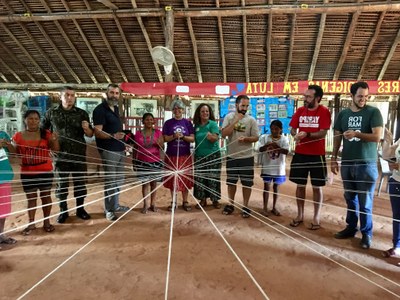Pico da Neblina National Park Workshop Builds Consensus for Management Plan
The Chico Mendes Institute of Biodiversity (ICMBio) made progress on the development of a management plan for Pico da Neblina National Park. After over three years of dialogue and planning, ICMBio held a workshop on September 17 to 21 at the park in Amazonas State, where it applied a new approach for creating management plans based on the U.S. Forest Service Foundation Document methodology. This collaboration is a Partnership for the Conservation of Amazon Biodiversity (PCAB) initiative supported by USAID/Brazil.
ICMBio is working to build consensus for Pico da Neblina National Park management among local communities, as well as state and federal authorities. Pico da Neblina National Park includes parts of four indigenous territories, Balaio, Cué-Cué Marabitanas, Médio Rio Negro II, and Yanomami, the Six Lakes Biologic Reserve and the Amazon National Forest.
Indigenous representatives from Yanomami, Tucano, Baré, Cué-Cué and Marabitana, State Secretaries, local associations, military representatives, the National Indigenous Foundation (Funai), the Instituto Socioambiental (ISA), and the Public Prosecutor’s Office participated in the workshop. These parties are working to bring more autonomy to the park, increase visibility for community-based initiatives in the region, and increase social participation in the park’s conservation and management.
ICMBio successfully ensured that all interested parties participated in the workshop, adapted the U.S Forest Service methodology to the Amazonian context and overcame communication challenges. ICMBio team responsible for management plans (COMAN) leveraged its extensive experience seeking buy in across authorities for conservation management plans during the workshop. It has conducted 13 workshops using the new methodology, and the team of facilitators produced a robust draft management plan with the support of the workshop participants.
Further meetings among these parties will take place including a zoning meeting in the Medio Rio Negro II indigenous territory. The ICMBio facilitators will incorporate into the management plan information that they gather during these meetings and then provide the local communities an opportunity to comment.


